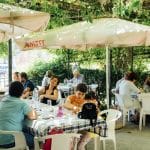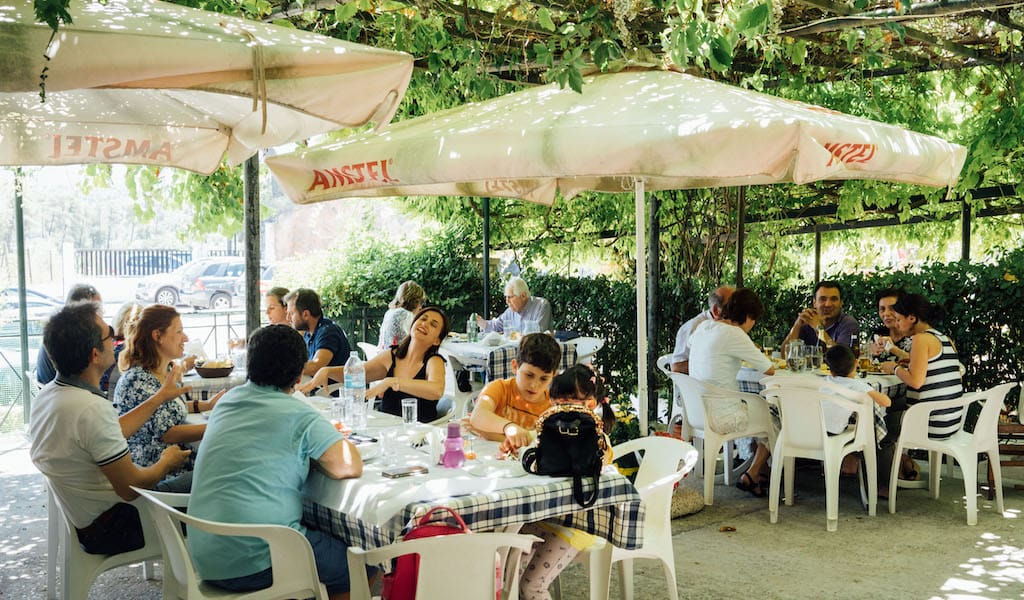“Pame volta” is the commonest of expressions. Greeks use it all the time, when they want to go for a walk, a drive or just plain “out.” It literally means, “Let’s take a turn.”
So when we asked Xenophon Katramadis why he named his new restaurant Volta, it seemed to make perfect sense. Once you’ve been there, he explains, the next time you tell your companion(s), “pame volta,” you might remember the restaurant’s good food and pleasant atmosphere and actually go back there instead of just taking a stroll around the block.
We ventured into Kato Petralona (Lower, there is also Ano or Upper) on a quiet weekday night in early April to give Volta a try, following a tip from a food-loving friend. The district, southwest of the Acropolis and the Hill of the Muses, has seen many changes over the years; its current name comes from the Ottoman era, when the village was known for its stone threshing floors (Petrina Alonia). By the late 19th and 20th centuries it had become an area of small factories. (You can even visit one factory that makes silk threads and tassles; called Mentis Passementerie, it was bequeathed to the Benaki Museum and isn’t far from Volta.) But nowadays the neighborhood’s low buildings are more likely to be artists’ workshops, middle-class homes, Airbnb rentals or attractive places to eat.
 Volta too had another life before Xenophon and his wife, Elizavet, made it their own in 2015. The restaurant is housed in what used to be a small warehouse for goods that were under state control. Such a place was called Monopolio, or Monopoly, and there retailers would go to buy kerosene, salt, matches and, for some obscure reason, decks of cards, which being taxed were a source of revenue. This practice only ended in 1985, when Greece joined the European Union. A popular restaurant called Monopolio eventually opened on the premises – you can still see the original sign inside Volta above the window into the kitchen. Xenophon and Elizavet were regulars and became friends with the owners, and when the cook Kyria Angeliki retired, they made a bid to take it over.
Volta too had another life before Xenophon and his wife, Elizavet, made it their own in 2015. The restaurant is housed in what used to be a small warehouse for goods that were under state control. Such a place was called Monopolio, or Monopoly, and there retailers would go to buy kerosene, salt, matches and, for some obscure reason, decks of cards, which being taxed were a source of revenue. This practice only ended in 1985, when Greece joined the European Union. A popular restaurant called Monopolio eventually opened on the premises – you can still see the original sign inside Volta above the window into the kitchen. Xenophon and Elizavet were regulars and became friends with the owners, and when the cook Kyria Angeliki retired, they made a bid to take it over.
“I’m a printer by profession, Elizavet was a teacher, but with the crisis my business started drying up in 2010. Two of my best clients were cigarette companies but the government passed a law forbidding advertising, and at the same time other multinational companies I worked with moved out of Greece. We’d been faithful customers, didn’t want to see the restaurant close, so we made a huge leap. We had always liked to cook but we had a lot of help from people who knew the business,” Xenophon explains.
From what we could see, they were quick learners. We took a long time studying the menu – nibbling on their own olive bread – because even the dishes that sound familiar are not always what they appear to be. Take, for example, spanakopita (spinach pie). Here, it’s actually a salad. Moreover, their cheese dip, myttotos, made of three white cheeses plus black garlic, “goes back to the time of Hippocrates,” and the liver with apples, a combination we’ve never heard of, is a recipe from Karditsa in the northern Greek region of Thessaly.
Xenophon came over to help. “We want to show people what Greek cuisine is really like. It’s not just souvlaki, gyros and moussaka. So in July and August when we’re closed, we travel all over the country looking for recipes, and because we love Greek wines too, we find recipes that go with them,” he says.
Even the dishes that sound familiar are not always what they appear to be.
We saw dishes from Mani, Drama, Lesvos, Smyrna and Constantinople, the Ionian, the Aegean, Crete, Thrace and Thessaly, as well as quite a few vegan options, this being Lent, a time when many Greeks avoid meat and dairy products. But even though we are very familiar with regional specialties, many seemed unfamiliar because of the imaginative “tweaks” introduced.

Finally we settled on the spanakopita, myttotos, liver with apples, plus chickpea keftedes (similar to falafel) and Smyrna “fingers” (lamb meatballs with tomato sauce), wishing we had room for more. But glad we’d restrained ourselves when we came to dessert, where the chocolate pie was good but the halva mousse had us in ecstasy. Halva – a typical Lenten sweet made from tahini and sugar – usually leaves us cold but this invention left us speechless.
Xenophon also told us about the décor – he pointed out the printing blocks above our table that spell the names of the people who work at Volta; a kind of floor to wall “curtain” of thick paper with an early French recipe printed on it; and the copper engraving plate from his print shop. There are splashes of color on the other walls but the overall theme is soothing pine – wooden floors, wooden tables and chairs, and even a wooden ceiling and a wooden wall, which are both slatted like big Venetian blinds, adding to their interest.
For background music he’s chosen remakes of old classics, Greek and Western, but on Sunday nights there are live rebetika sessions, with a group who specialize in the rarely played songs dating back to before the Second World War.
Volta changes its menu not only with the season but with the holidays, so it looks as though we’ll have to keep going back to continue our exploration of Greece’s rich regional dishes with a new perspective.
 July 31, 2019 Agroktima Regoukou
July 31, 2019 Agroktima Regoukou
Growing up in Athens in the 1980s and 90s, weekend family excursions to a suburban […] Posted in Athens June 5, 2019 Simul
June 5, 2019 Simul
Growing up, Nikos Thomas’ passion had always been music. Born and raised in Sparta, he […] Posted in Athens January 4, 2022 In Love Again
January 4, 2022 In Love Again
It was a late night in 2009 when Thanos Prunarus finished his shift at Pop, a […] Posted in Athens
Published on May 13, 2019
Related stories
July 31, 2019
AthensGrowing up in Athens in the 1980s and 90s, weekend family excursions to a suburban taverna were an integral part of life. Back then, prices were affordable and eating out was not a luxury; in fact, it was a social necessity. It was a way to catch up with friends, enjoy good food and good…
June 5, 2019
AthensGrowing up, Nikos Thomas’ passion had always been music. Born and raised in Sparta, he moved to Athens for school, but instead of going to class, he spent his time drumming for his band, The Darkstar. When Thomas was desperately looking for work in 2005, he was forced to switch gears and take on a…
January 4, 2022
AthensIt was a late night in 2009 when Thanos Prunarus finished his shift at Pop, a now-shuttered bar in Athens’ historical center on the tiny Klitiou pedestrian street. He was just a few steps out the door when he spotted a “For Rent” sign taped to the front of an old, empty store. This area…



















































































